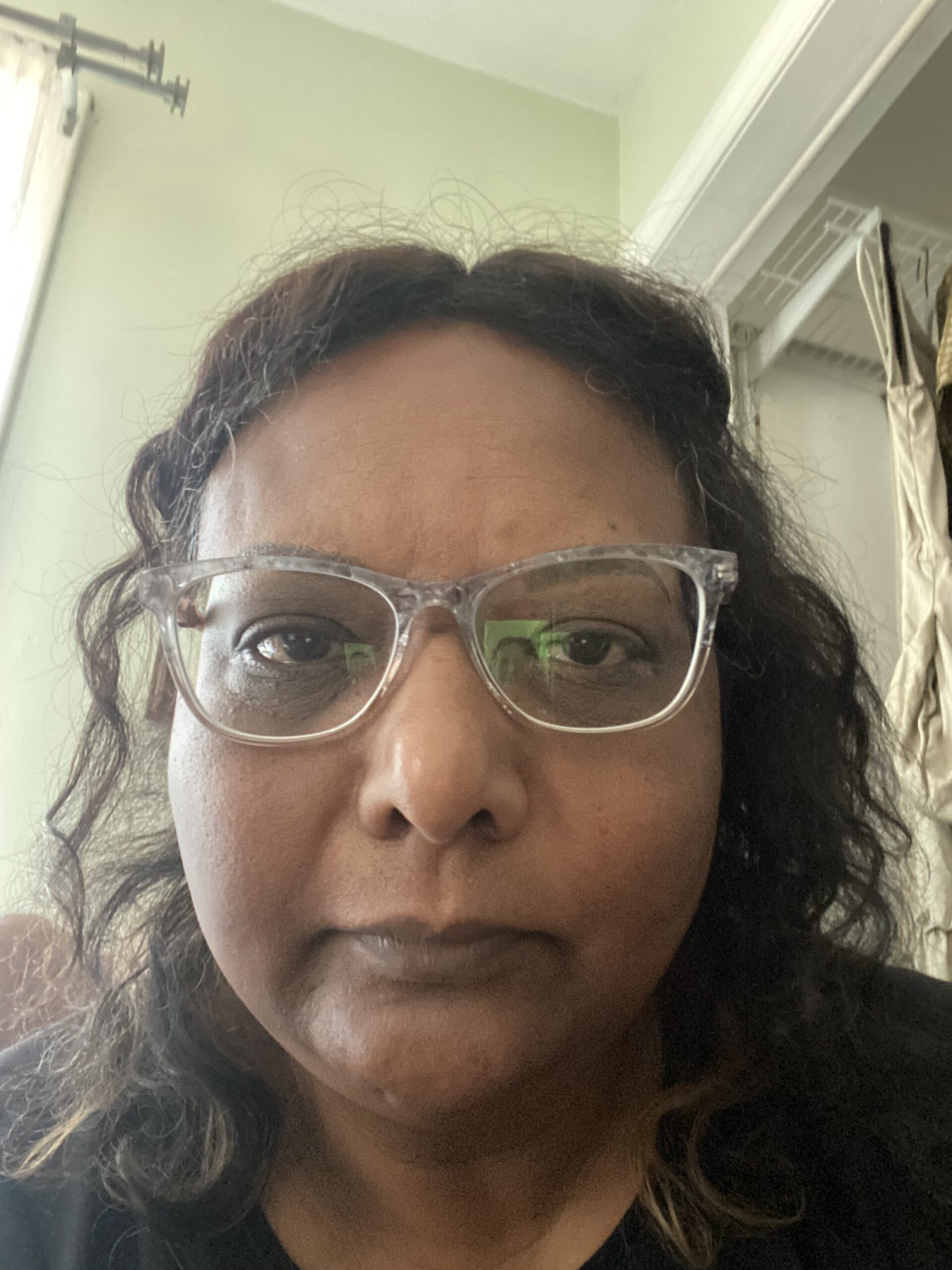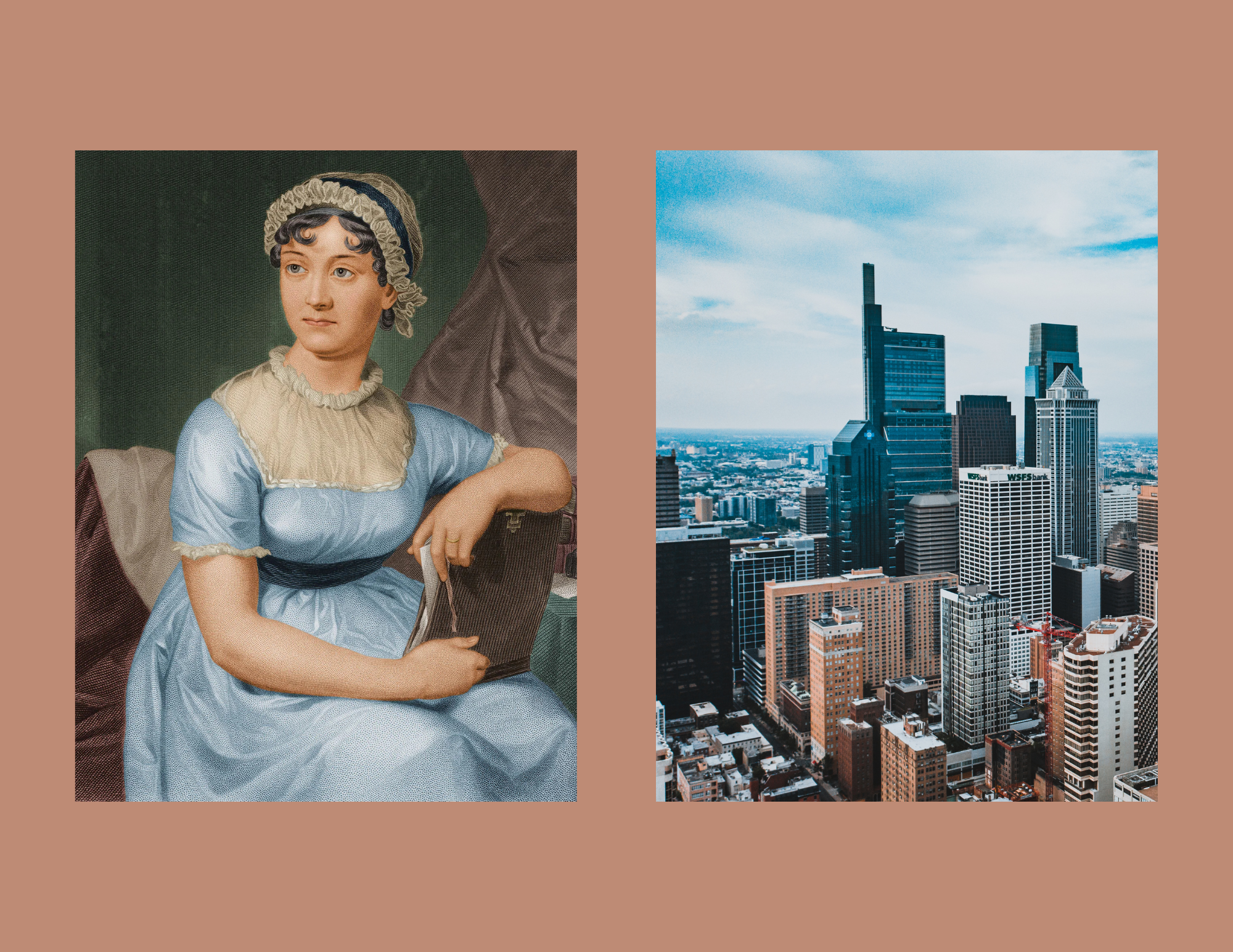As recorded by Sheila Sandapen
“My dear Miss Austen, I am simply delighted to meet you after all these years. It is a true honor, and I must express my pleasure and admiration for your books—and no, I will not admit to them being mere scribblings full of shocking spelling and grammar. Please take a seat and make yourself comfortable. Would you care for some tea?”
My guest laughs lightly.
“Madam, if you would not think me too forward, may I have a glass of orange wine or Mead if you should have it? I feel positively ready to float away on tea.”
Once a Madeira has been served and our appreciation over its many admirable qualities has been exhausted, our conversation resumes.
“Miss Austen, I believe this is your first visit to Philadelphia?”
Austen, thin and pale but excited, leans forward. “Yes. Travel is so much more possible than in my age, and while the plane is a marvel, it is not unlike a badly sprung carriage in that it can be both swift and uncomfortable. I was most put out by having to remove my slippers, and the ‘X-ray machine’ made me wonder if I would be seen in my unmentionables.”
“Ah, Miss Austen, I see you mock our foibles!”
“It is an innate flaw of mine, I confess, in that I must observe and find the ridiculous in my surroundings, but I mean no malice. My dear sister Cassandra, concerned by what she called my sharpness, burnt my letters after my death so that I would not incur the wrath of people whom I considered friends.” She laughs. “It amuses me much that the story is that I wanted to preserve my lady-like demeanor in the public’s eye. One has only to read my books to understand my character.”
Miss Austen, neatly dressed in a serviceable but not fashionable day gown, smiles and in that moment lights up the room. “Of course, the name ‘Philadelphia’ is well known to me as my Aunt Philadelphia Austen Hancock was mother to my beloved Eliza [de feuillide].”
For a moment, Miss Austen appears distracted, and the silence extends. I clear my throat and she immediately responds with a smile and lively manner,
“Of what were we speaking? Ah, yes. Modes of travel. While it is true I have not travelled extensively, I am aware of my readers. Your Mark Twain was most amusing when he professed, ‘Every time I read Pride and Prejudice I want to dig her up and hit her over the skull with her own shin-bone,’ and yet I can’t help but notice with delight that he continues to read and re-read me….”
“Ahem. Er… of course, your admirers on this continent are legion. I congratulate you on the 200th anniversary of the publication of Emma. It was actually your only novel that was published in America during your lifetime….”
“I must interrupt you, ma’am. I cannot sit here unaffected. The laws of copyright between our countries were most unjust in 1816. An American printer was able to reprint my novel simply by purchasing a copy from England and then, without my Knowledge or permission, reproduce it and earn money from my work while I and my family did not…”
Agitated, Miss Austen jumps to her feet.
“Madam, I beg leave of you. If I stay, I will commit an unforgivable offense in light of your hospitality. This subject exercises me too much and I hope we may continue some other day when calmer heads may prevail….”
For further reading:
“Austen was a bad speller: U.K. scholar” http://www.cbc.ca/news/arts/austen-was-bad-speller-u-k-scholar-1.880277. To see Austen’s original work, go to http://www.janeausten.ac.uk/index.html
Austen, Jane. “The real object of this letter is to ask you for a receipt, but I thought it genteel not to let it appear early. We remember some excellent orange wine at Manydown, made from Seville oranges, entirely or chiefly, and should be very much obliged to you for the receipt, if you can command it within a few weeks.”—Letter to Alethea Bigg, Jan. 24, 1817 https://www.jausten.it/jalett141-150.html
Jane Austen died in 1817. Her older sister and confidante, Cassandra, allegedly destroyed the majority of Jane’s letters shortly before her own death. See: “‘The Truth is she did the right thing’: The mystery of why Jane Austen’s letters were destroyed—by her own sister.”
For more on Philadelphia Austen Hancock and Eliza De Feuillilde (Austen’s cousin and then sister-in-law), see https://www.geriwalton.com/philadelphia-austen-hancock-eliza-de-feuillides-mother/ and https://www.geriwalton.com/eliza-de-feuillide-jane-austens-cousin-and-sister-in-law/
Twain, Mark. Letter to Joseph Twichell, 13 September 1898. “I haven’t any right to criticise books, and I don’t do it except when I hate them. I often want to criticise Jane Austen, but her books madden me so that I can’t conceal my frenzy from the reader; and therefore I have to stop every time I begin. Everytime I read ‘Pride and Prejudice’ I want to dig her up and beat her over the skull with her own shin-bone.”
Mathew Carey published the first US edition of Emma in 1816 in Philadelphia. A copy of the 1816 Emma is on display at Goucher College in Baltimore. See: http://www.emmainamerica.org/
There was no international copyright recognized in the United States until the late 1780s, so printers would order books from England, reprint them, and reap all the profit. Philadelphia-based Mathew Carey was one such publisher. To read about his legacy, see https://www.mathewcarey.info/life-legacy/

